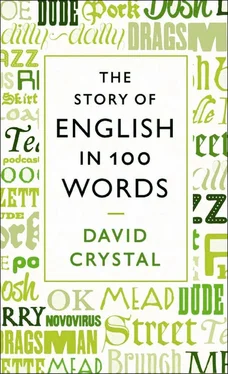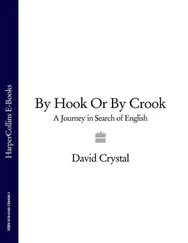Why do I think this is the sort of thing that happened? Because this is a game people still happily play today, and human nature hasn’t changed that much in 500 years. A great deal of entertainment can be derived from thinking up the funniest way of describing a group of ‘X’ — where X can be anything from dog handlers to dentists. What’s the best collective noun for politicians, or undertakers, or linguists? Competitions have produced some fine examples. I made my own collection a few years ago, and found many that deserve prizes. Here’s a top ten:
An absence of waiters
A rash of dermatologists
A shoulder of agony aunts
A clutch of car mechanics
A vat of chancellors
A bout of estimates
A lot of auctioneers
A mass of priests
A whored of prostitutes
A depression of weather forecasters
An exces’s of apostrophes
And still they come. In recent times I’ve encountered a crash of software, an annoyance of mobile phones and a bond of British secret agents .
 36. Doable — a mixing of languages (15th century)
36. Doable — a mixing of languages (15th century)
How many English words do you know? People tend to seriously underestimate the size of their personal vocabulary. They think that it’s only a few thousand words. But if you were to take a dictionary and work your way through, ticking the words you know, you’d be pleasantly surprised. The total would be at least 50,000.
This figure seems less surprising when we reflect on how easy it is to make up new words. A single word can generate a whole family. Happy, happily, happiness, unhappy, unhappily, unhappiness, happy-go-lucky, happy-hour, happy-dust, happy-hearted, happy-clappy, trigger-happy, slap-happy … The prefixes (such as un- ) and the suffixes (such as -ly and -ness ) are especially important in building up our vocabulary. There are just over a hundred of them in everyday English, and at least one will be found in nearly half the words in the language. Most of them came in from Latin and French during the Middle Ages. That’s when we find a flood of new words beginning with such forms as con-, de-, dis and ex- , and ending with such forms as -ment, -tion, -ity and -able .
The French suffix -able alone produced hundreds of words. It was immediately used not only with French loanwords, such as agreeable and changeable , but also with Old English words to produce such forms as knowable and doable . Doable , first recorded in the mid-1400s, is a good choice to represent the class. Do is one of the earliest known English verbs, found in some of the first Anglo-Saxon texts, and here it is happily being used with a French suffix. It shows that word-coiners are no respecter of origins.
Another flood of creations began when un- started to be used with -able words, in the 14th century, so we get unknowable, unthinkable and many more. Then a remarkable thing happened. The -able was added to two-element verbs. We find get-at-able and come-atable , and then unget-at-able and uncome-at-able . Some writers went over the top. Ben Jonson coined un-inone-breath-utterable . But the basic pattern became very popular. Since the 12th century there have been hundreds of coinages, such as undryupable and unkeepoffable . Not all have achieved a permanent place in the language, but some, such as unputdownable , unswitchoffable and unwearoutable , are often used. And a few have developed their own linguistic families. What is the state or quality of ‘being get-at-able’? The 19th century provided the answer. Get-at-ability. Get-at-ableness .
 37. Matrix — a word from Tyndale (16th century)
37. Matrix — a word from Tyndale (16th century)
Ask most young people what matrix means and they will tell you. It is the name of the computer-simulated reality which will imprison the minds of human beings in the not-so-distant future, and it has a capital M . They are thinking of the 1999 science-fiction action film starring Keanu Reeves. This is as far away from the Bible as it is possible to get, but the link is there, linguistically. For the first clear use of the word matrix is in an English translation of the Gospel of St Luke (2: 23) made in 1525 by William Tyndale.
It’s often said that no single book has had greater influence on the vocabulary of the English language than the Bible. I don’t dispute that, as long as by ‘Bible’ we mean all the English translations that have been made, starting with John Wycliffe’s manuscript version in about 1382 and ending with the King James Bible of 1611. The King James text is usually cited as the main influence, and in a way it was, as its official status meant that it would be heard and read by more people in Britain than any previous translation. But its main role was to popularise. Most of the words and phrases that would become part of everyday English had already been introduced by earlier translations — and by Tyndale, in particular. Think of let there be light , am I my brother’s keeper? , let my people go , the powers that be , the signs of the times and eat, drink and be merry. These are all Tyndale.
In vocabulary he was extremely conservative, as were most Bible translators. He wanted his translation to be understood by the ordinary person rather than the theologian, so he went in for everyday words, and hardly ever coined words himself. Only 120 entries in the Oxford English Dictionary have a first recorded use attributed to him. They include several compound words, such as busybody , castaway , broken-hearted , long-suffering and stumbling-block , as well as childishness , excommunicate , ungodliness — and matrix .
Matrix has had an interesting history. It originates in the Latin word for ‘mother’, mater . Tyndale uses it to mean a ‘womb’, which was one of its meanings in Latin. By the 16th century the sense had broadened to mean a place where something begins; by the 18th century, the structure or material in which something is embedded; and by the 19th century, the elements which make up that something, seen as a network. People started applying the term to social networks, talking about a political matrix , for example. And in the mid-20th century it started to be used in the business world: an organisation in which communication operates through a web of relationships was said to illustrate matrix management .
Meanwhile, various technologies had adopted the term. Dentists used it to describe the material which serves as a temporary wall for a cavity when filling a tooth. Photographers used it as part of their printing process. Printers used it to describe the mould in which a piece of metal type was cast. Electronic engineers used it to talk about a type of circuit. And in 1990s’ computing, the matrix became a popular term for the global network of electronic communication.
The stage was set for Keanu Reeves. Here we have a word which at one level means an organisational network and at another level means the electronic network that makes up cyberspace. It was only a matter of time before it would be picked up by the science-fiction world. And time is the relevant word, as the first recorded use of matrix in this genre is in a 1976 episode of Dr Who .
Читать дальше

 36. Doable — a mixing of languages (15th century)
36. Doable — a mixing of languages (15th century) 37. Matrix — a word from Tyndale (16th century)
37. Matrix — a word from Tyndale (16th century)










